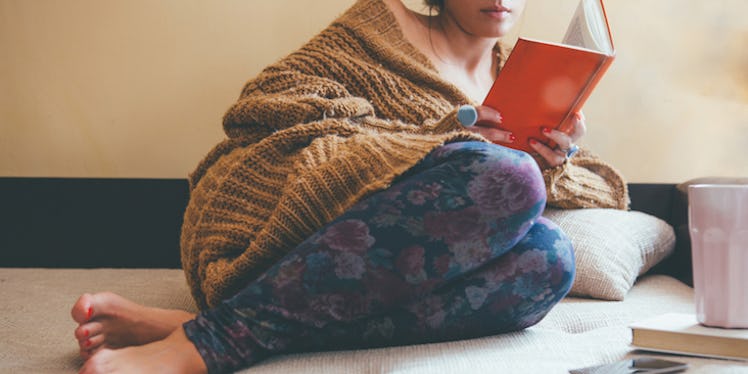
Why You Should Be Reading Yourself To Sleep, According To Science
Some nights, it can feel nearly impossible to fall asleep. You know you should be snoozing because you have to be up super early for work, but you just cannot stop tossing and turning for the life of you. With so many suggestions and tips out there on how to get some quality shut-eye, you might be overlooking the most simple solution in the book (no pun intended): Reading to help you fall asleep is said to be one of the easiest, and even most enjoyable ways to achieve a blissful slumber full of sweet dreams.
Everyone has their own way of tiring themselves out and quieting mental chatter so they can catch some Zs, but in a study done at the University of Sussex, cognitive neuropsychologist Dr. David Lewis found that cozying up with your favorite book might just be the best way to go. The research found that reading a good book before bed can help reduce stress levels by as much as 68 percent, a higher number than that associated with other common nighttime rituals, like sipping tea, listening to music, or going for a walk.
Dr. Lewis found that it takes just six minutes of reading to significantly relax your body and your mind — which is literally so simple to incorporate into your nighttime ritual if you leave a good book waiting for you on your nightstand, just sayin'.
Flipping through the pages of a good book signals to your body that it's time to go to bed because it calms your brain and helps you decompress after a busy day.
But it's not just the books themselves that are helping you get all the beauty sleep you deserve; it's actually the fact that reading good old-fashioned paperbacks is keeping you away from all that stimulating technology, which isn't exactly ideal for helping you fall asleep.
According to a 2015 study, college students who consistently found themselves scrolling through their social media accounts when it was time to hit the hay were found to be more likely to feel tired throughout the next day, and the results even showed that their critical thinking abilities had been negatively affected, as well.
Another study done in 2016, which was published in the journal Preventive Medicine, saw pretty similar results: The researchers found that the more people used social media (in general, not just before/in bed), the more likely they were to experience sleep disturbances.
Basically, if you replace your evening TV time or bedtime social media catch-up with an intriguing and interesting novel, you might have a way easier time falling asleep.
Your first instinct might be to pick up a boring book that'll have you yawning and shutting your eyes with the flip of a page, but UK company Mattress Online actually recommends reading yourself to sleep with a comforting, yet captivating book. If you read a book you're not interested in, in hopes of drifting off to dreamland, your mind will inevitably wander, and you'll be back to square one, festering in the stresses that tend to keep you up in the first place.
Along with making reading a regular part of your evening routine, keeping your technology in the other room, adding some relaxing essential oils blends to your sleep space, and even drawing a warm, soothing bath are all ways to make sure you stay soundly asleep throughout the night.
Keeping your room at a relatively cool temperature (between 60 and 67 degrees Fahrenheit, to be exact) will do wonders for your sleep schedule as well, according to Simplemost. Grab your fascinating book, your fuzziest blanket, your favorite herbal tea, and you're good to go, girl.
So, there you have it, friends. Be your own mom and read yourself to sleep tonight for the best shut-eye of your life. After all, moms always know the answer to everything, don't they?